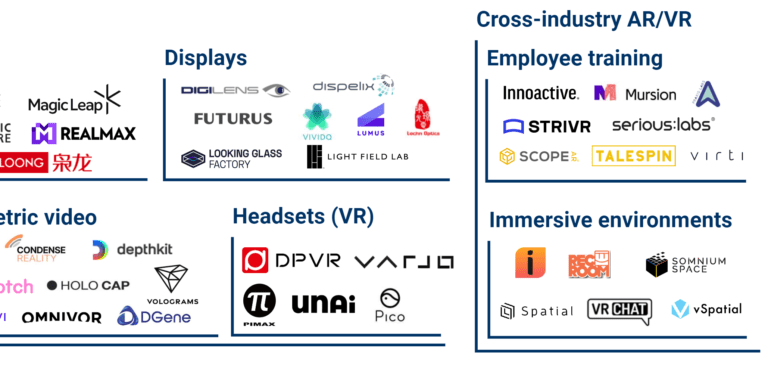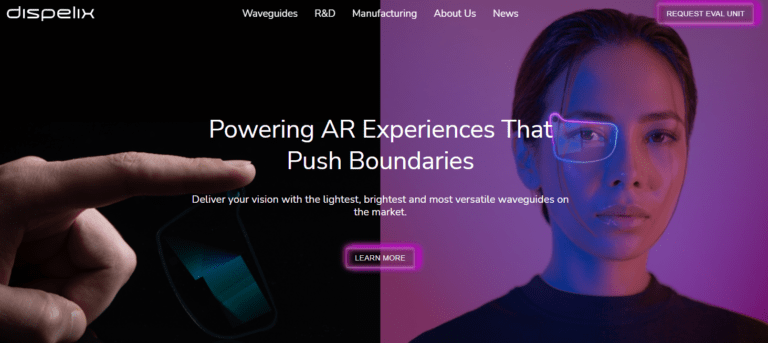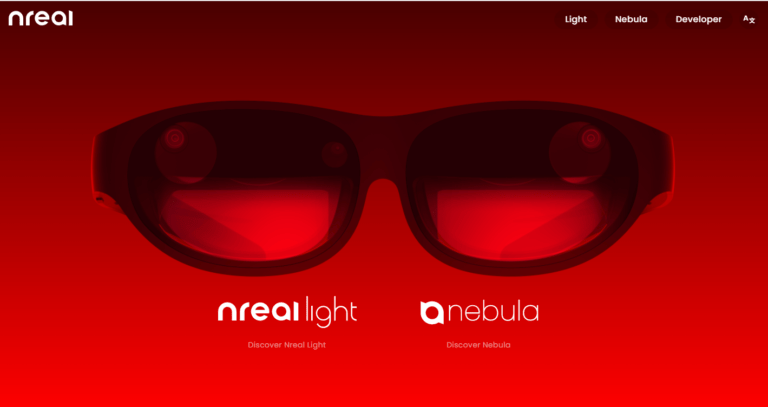
Xreal
Founded Year
2017Stage
Series D | AliveTotal Raised
$306MValuation
$0000Last Raised
$60M | 8 mos agoMosaic Score The Mosaic Score is an algorithm that measures the overall financial health and market potential of private companies.
+9 points in the past 30 days
About Xreal
Xreal develops mixed reality wearables within the consumer electronics sector. It offers mixed reality glasses that provide a wide-screen and vivid display for user experiences. The company offers smart glasses, optical displays, and other visual-related technologies such as spatial positioning and scene recognition. Xreal was formerly known as Nreal. It was founded in 2017 and is based in Haidian, China.
Loading...
ESPs containing Xreal
The ESP matrix leverages data and analyst insight to identify and rank leading companies in a given technology landscape.
The augmented reality (AR) glasses market focuses on developing and manufacturing wearable glasses that overlay digital information and virtual objects onto the real world. For businesses, AR glasses offer solutions in assistant reality, augmented reality, and mix reality to accelerate digital transformation in areas such as maintenance, inspection, procurement, supervision, and manufacturing with…
Xreal named as Leader among 15 other companies, including Meta, Qualcomm, and Magic Leap.
Loading...
Research containing Xreal
Get data-driven expert analysis from the CB Insights Intelligence Unit.
CB Insights Intelligence Analysts have mentioned Xreal in 4 CB Insights research briefs, most recently on Apr 5, 2023.
Expert Collections containing Xreal
Expert Collections are analyst-curated lists that highlight the companies you need to know in the most important technology spaces.
Xreal is included in 3 Expert Collections, including AR/VR.
AR/VR
1,505 items
This collection includes companies creating hardware and/or software for augmented reality, virtual reality, and mixed reality applications.
Unicorns- Billion Dollar Startups
1,244 items
Smart Home & Consumer Electronics
1,234 items
This Collection includes companies developing smart home devices, wearables, home electronics, and other consumer electronics.
Latest Xreal News
Sep 18, 2024
News provided by Share this article Share toX NEW YORK, Sept. 18, 2024 /PRNewswire/ -- Report on how AI is redefining market landscape- The global smart glasses market size is estimated to grow by USD 76.5 million from 2024-2028, according to Technavio. The market is estimated to grow at a CAGR of 13.84% during the forecast period. Implementation of automation in industrial sector is driving market growth, with a trend towards rise in number of strategic partnerships and acquisitions. However, high initial cost of smart glasses poses a challenge. Key market players include 3M Co., AGC Inc., Alphabet Inc., Atheer Inc, Elbit Systems Ltd., Good Sky Electric Co. Ltd., Huawei Technologies Co., Ltd., Iristick NV, MAD Gaze Ltd., Magic Leap Inc., Microsoft Corp., Nreal Ltd., Optinvent, OXSIGHT Ltd., Seiko Epson Corp., Sony Group Corp., ThirdEye Gen Inc., Toshiba Corp., Vuzix Corp., and Xinology Co. Ltd.. Technavio has announced its latest market research report titled Global smart glasses market 2024-2028 Key insights into market evolution with AI-powered analysis. Explore trends, segmentation, and growth drivers- View the snapshot of this report Smart Glasses Market Scope Key companies profiled 3M Co., AGC Inc., Alphabet Inc., Atheer Inc, Elbit Systems Ltd., Good Sky Electric Co. Ltd., Huawei Technologies Co., Ltd., Iristick NV, MAD Gaze Ltd., Magic Leap Inc., Microsoft Corp., Nreal Ltd., Optinvent, OXSIGHT Ltd., Seiko Epson Corp., Sony Group Corp., ThirdEye Gen Inc., Toshiba Corp., Vuzix Corp., and Xinology Co. Ltd. Market Driver The global smart glasses market is witnessing an increase in strategic partnerships and acquisitions. These collaborations enable vendors to enhance their offerings, broaden their reach, fortify their market position, and create innovative products. An instance of this trend is Vuzix Corporation's strategic partnership with Rods and Cones in February 2021. Through this alliance, Vuzix's M-Series Smart Glasses were integrated as an additional video-capturing device for Rods and Cones' virtual surgical collaboration platform. This partnership will lead to the development of advanced smart glasses, compatible with advanced technologies and components, thereby positively impacting the market. The Smart Glasses Market is experiencing significant growth in various industries, including Automotive and Transportation and Consumer Electronics. The USP of smart glasses lies in their ability to transform from opaque to transparent at the click of a button, offering panoramic views through automotive glass panels like windshields, rear-view mirrors, sun visors, sunroofs, and panoramic window panels. These glasses provide superior light transmission, enhancing tourist activities and sightseeing experiences by allowing a clear view of scenic beauty. Moreover, smart glasses offer multi-functional spaces, such as thermal insulation, dimming capabilities, and 3D designing proposition, making them ideal for unique spaces like offices, hospitals, and smart facades. The use of electrochromic, photochromic, thermochromic, PDLC glass, and smart glazing in these glasses is driving innovation in this market. The integration of electrical signals and film in glass panels further enhances their functionality, providing solutions for power generation, glare reduction, and more. In the automotive industry, smart glasses are revolutionizing the way we drive, offering a safer and more comfortable driving experience. In consumer electronics, they provide a unique experience, making them a must-have gadget for tech enthusiasts. With the increasing demand for sustainable and eco-friendly solutions, waste glass panels and rare chemicals are being repurposed to manufacture these smart glasses, making them a smart choice for businesses and individuals alike. Request Sample of our comprehensive report now to stay ahead in the AI-driven market evolution! Market Challenges The smart glasses market is currently in its innovation stage, with low sales and customer adoption. Enterprise versions dominate the market due to high penetration and vendor focus. The high average selling price (ASP) of USD1,397.39 is a result of limited consumer awareness and few AR applications. Vendors prioritize enterprise revenue, with prices ranging from USD150 to USD10,000. Enterprise users pay USD799.99 for Vuzix M300 Smart Glasses and USD1,799.99 for M400, while ThirdEye Gen's X2 Mixed Reality Glasses cost USD1,950 for enterprise clients. The market's growth may be hindered by the high ASP, limited consumer appeal, and enterprise focus. Vendors are releasing developer and commercial versions, catering to different use cases and price points. The Smart Glasses market is experiencing significant growth due to advancements in technologies such as Autonomous Vehicles and 5G. Challenges include integrating heads-up displays (HUD), minimalist architecture, and electrochromic technology for automatic tinting. Wearable technology, sensors, and Bluetooth connectivity are essential features. Audio smart glasses offer crystal clear sound, while smart glasses enhance outdoor sports and gaming experiences. Industrial and healthcare applications require specialty glasses with privacy features, switchable lenses, and Linux operating systems. Monocular and binocular designs cater to various needs. Miniaturization, AR experience, and acoustic insulation are key trends. Aerospace companies explore smart glasses for cockpit displays and SPD glass for light control, heat rejection, and acoustic insulation. Segment Overview Product 4.5 South America 1.1 Developer- Smart glasses developers, also known as prosumers, play a crucial role in the advancement of the smart glasses market. They are individuals involved in the design, manufacture, and development of these innovative devices. Vendors provide developer versions of smart glasses, which are not intended for commercial use. These developer kits enable developers to test and improve the hardware and software of smart glasses. Nreal, an augmented reality company, recently launched its developer version of air glasses in the US in September 2022. The demand for developer kits to create AR technology and apps is on the rise, leading to an ecosystem of new product development, effective use of hardware components, and appealing designs for smart glasses. Consequently, most vendors in the market initially release developer versions before commercializing their products. Download a Sample of our comprehensive report today to discover how AI-driven innovations are reshaping competitive dynamics Research Analysis The Smart Glasses market is experiencing significant growth due to the integration of advanced technologies such as Autonomous Vehicles, Heads-Up Display (HUD), and Augmented Reality (AR) experience. These glasses offer features like automatic tinting, minimalist architecture, and smart windows, providing optimal light control, heat rejection, and acoustic insulation. Electrochromic, SPD, photochromic, and thermochromic technologies are used to create switchable glasses, offering privacy and convenience. Specialty glass types include industrial and healthcare applications, with sensors and 5G technologies enabling smart automation and real-time data processing. Wearable technology advancements have led to the development of audio smart glasses with crystal clear sound experiences. The market is also exploring miniaturization and integration of various sensors for enhanced functionality. Market Research Overview The Smart Glasses market is experiencing significant growth due to the integration of advanced technologies such as Autonomous Vehicles, Automatic tinting, and Heads-Up Display (HUD). Minimalist architecture and Electrochromic technology are key trends in this sector, enabling glasses to adapt to various lighting conditions. Wearable technology, 5G technologies, and Augmented Reality (AR) experience are also driving innovation in this field. Miniaturization, Sensors, and Audio smart glasses with crystal clear sound are popular choices for outdoor sports enthusiasts. Smart glasses offer anti-glare properties, making them ideal for use in industrial and healthcare settings. Monocular and Binocular Smart Glasses, Smart Glasses, and Polymer-Dispersed Liquid Crystals (PDLC) are some of the popular types. Linux operating system and Linux kernel, Bluetooth, USB, and Full HD display are essential features. Smart glasses have applications in gaming, healthcare, industrial, and specialty glass industries. They offer HDMI connectivity, thermal insulation, and smart facades. Smart construction materials, sightseeing destinations, and unique spaces are also potential markets for smart glasses. Opaque and Transparent options with dimming capabilities are available, replacing conventional glasses and waste glass panels. Rare chemicals and electronic systems are used in the production of Electrochromic and Photochromic glass, Thermochromic glass, and PDLC film. Smart glazing, film, and glass panels are used in various applications, including automotive glass panels, rear-view mirrors, windshields, sun visors, sunroofs, panoramic view windows, and light control. Smart glasses offer acoustic insulation, heat rejection, and privacy features, making them essential in emergency room areas and smart automation. Aerospace companies and automotive industries are major consumers of smart glass technology, with applications in USP, rear-view mirrors, windshields, sunroofs, and panoramic view windows. Smart glasses offer light transmission and are ideal for tourist activities, providing a panoramic view of scenic beauty. Smart construction materials, smart facades, skylights, office spaces, hospital partitions, and smart automation are other potential markets for smart glasses. Table of Contents: About Technavio Technavio is a leading global technology research and advisory company. Their research and analysis focuses on emerging market trends and provides actionable insights to help businesses identify market opportunities and develop effective strategies to optimize their market positions. With over 500 specialized analysts, Technavio's report library consists of more than 17,000 reports and counting, covering 800 technologies, spanning across 50 countries. Their client base consists of enterprises of all sizes, including more than 100 Fortune 500 companies. This growing client base relies on Technavio's comprehensive coverage, extensive research, and actionable market insights to identify opportunities in existing and potential markets and assess their competitive positions within changing market scenarios. Contacts
Xreal Frequently Asked Questions (FAQ)
When was Xreal founded?
Xreal was founded in 2017.
Where is Xreal's headquarters?
Xreal's headquarters is located at 43 N. 3rd Ring W. Rd, Haidian.
What is Xreal's latest funding round?
Xreal's latest funding round is Series D.
How much did Xreal raise?
Xreal raised a total of $306M.
Who are the investors of Xreal?
Investors of Xreal include Gentle Monster, Alibaba.com, Hongtai Capital Holdings, HongShan, GP Capital and 16 more.
Who are Xreal's competitors?
Competitors of Xreal include Arspectra, Magic Leap, Rokid, Kura Technologies, Dispelix and 7 more.
Loading...
Compare Xreal to Competitors

RealWear is a company specializing in the development of industrial smart glasses designed for frontline workers across various sectors. Their products are AI-voice-powered smart glasses that aim to enhance productivity, safety, and efficiency by providing hands-free operation and real-time access to information and expertise. RealWear's solutions are widely adopted in industries such as automotive, mining, oil & gas, warehousing, healthcare, and manufacturing. RealWear was formerly known as WearNext. It was founded in 2016 and is based in Vancouver, Washington.

Dispelix is a company focused on the development of extended reality technology within the tech industry. The company's main offering is its see-through waveguide technology, which is used as transparent displays in extended reality devices, combining the real and virtual worlds in the user's field of vision. Dispelix primarily serves the extended reality industry. It was founded in 2015 and is based in Espoo, Finland.

Magic Leap develops Augmented Reality (AR) technology in the tech industry. Its offerings include an AR platform for enterprises, designed to support workflows, productivity, and return on investment. This technology allows teams to collaborate remotely, conduct reviews with 3D visualization, and provide real-time expertise to frontline workers. The company was founded in 2010 and is based in Plantation, Florida.
Lumus is an AR optics company focused on the development of display technology. The company's main offerings include transparent displays for smart eyewear and head-mounted displays, which are designed to enhance the way people interact with reality. Lumus primarily sells to the technology sector, with its products being used in augmented reality devices. It was founded in 2000 and is based in Ziona, Israel.

Atheer provides Augmented interactive Reality (AiR), combining the power of 3D augmented reality with gesture-based computing interaction to unlock human productivity. Atheer's AiR SmartGlasses are the industry's only mobile, gesture-controlled see-through smart glasses that allow users to view critical workflow information overlaid onto the real world, making it possible for users to interact with data in a natural way and collaborate with their peers. Using the Atheer AiR Platform, independent developers and companies around the world are now creating productivity applications for use across the enterprise. It was founded in 2011 and is based in Santa Clara, California.

DigiLens is a company that focuses on the development of augmented reality technology in the optics and smartglasses industry. The company's main offerings include state-of-the-art proprietary photopolymer materials and manufacturing processes, as well as best-in-class waveguides for extended reality and augmented reality applications. DigiLens primarily serves the augmented reality industry. It was founded in 2003 and is based in Sunnyvale, California.
Loading...



